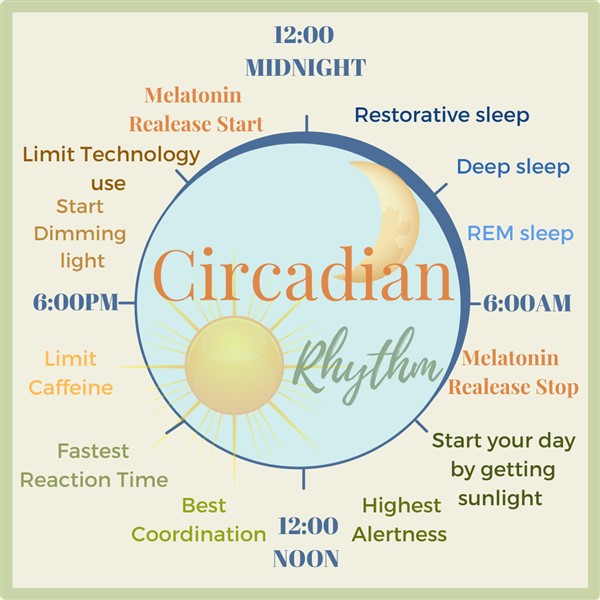We evolved over millions of years, living on a planet that travels around the Sun every year and spins once every 24 hours. We’ve grown with the seasons that mark our years and the light and darkness that make up our days. These two cycles, the yearly and the daily are stamped on our DNA; it is in our very genes.
Suppose we are lucky and we keep ourselves in relatively good shape. In that case, we can live a long life and get to experience about 90 trips around the Sun. To keep lady luck on our side and keep in good shape, we must pay attention to the other cycle, our daily 24-hour cycle.
Circadian Rhythm.
We call this 24-hour cycle the “Circadian Rhythm” after the Latin word “Circa-Diem” or “about-a-day.” The Circadian Rhythm conducts and prepares our bodies for the day ahead through a beautifully intricate system of hormone release and restraint. It helps us wake up in the mornings, signals our bodies and brains for the best time to exercise or hunt. It predetermines the best time for alertness and coordination and prepares our bodies to digest the food we eat. It prepares our bodies to relax and get ready to sleep. And when we are asleep, it helps our body’s internal organs rest, repair, and rejuvenate.
Our Circadian Rhythm evolved to wake us up with the dawning of the day and settle us down with the setting of the Sun and in between gather, prepare food, and eat. Unfortunately, our modern society has short-circuited our body’s natural rhythms. We have an abundance of food, so we eat all day. Instead of fasting between meals, we interrupt our digestive process, thereby confusing our natural rhythm. By discovering electricity, we have 24-hours of light. Our TVs, computers, and handheld devices are constantly active, stimulating our senses and challenging our natural sleep cycle.
Circadian Disruption.
Modern society has become exceptional at ignoring and disrupting our body’s natural rhythms. Circadian disruption has wide-ranging impacts on our health at every level, physically, mentally, and emotionally. The short-term effects of lack of sleep can be fatigue, irritability, moodiness, brain fog, and anxiety. In the long term, it can lead to increased risk of a wide variety of disorders and diseases, reproductive disorders, metabolic disorders such as diabetes and obesity, cardiovascular diseases, cancer, neurodegenerative and mental health issues, such as bipolar and depressive disorders.
The two most extreme examples of Circadian disruption are shift work and jet lag. If you have experienced these, then you know how significant the impact can be on your body. The less extreme and universal examples of circadian disruption are watching TV, texting on your phone, or checking social media into the wee hours. Our body’s internal clock is preparing us to sleep by introducing the sleep hormone melatonin. However, the light from our devices is telling the body to wait, stay awake; we still have light.
One of the most common side effects of Circadian disruption is weight gain. If you sleep for only 5 hours a night and not the 8 hours your body requires, you will eat 22% extra calories the next day. That adds up to over an extra day’s calorie intake per week. Not alone are you eating more; you are not allowing your body to go through its natural digestive, rest, repair, and rejuvenation cycles.
The average human being is supposed to get 8 hours of sleep per day, which adds up to one-third of your life asleep. If you live a long life and reach 90 years of age, you will have slept for 30 of those years. If we spend that much time sleeping, you can be sure it is for a good reason. Rest, repair, rejuvenate and sleep to the rhythm.
Your Circadian Clock


